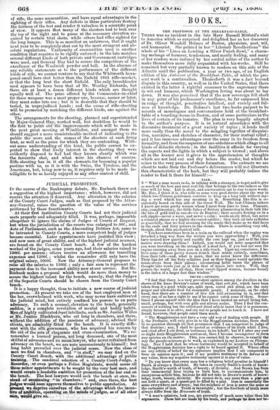JUDICIAL PROMOTION.
IN the course of the Bankruptoy debate, Mr. Roebuck threw out a suggestion of the highest importance; which, however, did not receive the attention it deserved: Any alteration in the salaries of the County-Court Judges, -such as that proposed by the Attor- ney-General, raises the question of the value of the services performed by the functionaries.
At their first institution County. Courts had not their judicial
seats properly and adequately filled. It was, perhaps; impossible altogether to ignore the claims of Judges of -Courts of Request, but when the jurisdiction of the courts was enlarged to 501., and Acts of Parliament, such as the Absconding Debtors Act, came to be intrusted to County Courts, a more competent body of judges became essential. Later appointments have justified this view ; and now men of great ability, and of the highest judicial acumen; are found on the County Court bench. A few of the hardest worked of the judges, some years ago, had their salaries raised to MOO/. per annum ; others receive an allowance for travelling expenses and 12001. ; whilst the remainder still only have the original salasy,.10001. Now the Attorney-General proposes to raise all the salaries to 15001. ," only a fair sum to represent the payment due to the increased ability now at our service. But Mr. Roebuok makes a proposal which would do more than money to secure the highest talent for the bench, namely, that the Judges of the Superior Courts should be chosen from the County Court
bench. _ _ _ It is a happy thought., thus to initiate a new course of judicial
promotion. At present we take one of.the best employed men at the bar, overwhelmed with work, who may never have cultivated the judicial mind, but entirely confined his powers to ex parte advocacy: To such a counsel, elevation_ to the bench, generally sudden, is a complete revolution of 'Mental and bodily habits. Men of highly cultivate& legal, intellects, such as Mr. Justice Willes or Mr, Justice Blackburn, who sat long in chambers, and there, without the addition of the paisions of advocacy, advised their clients, are admirably fitted for the 'bench. It is exactly diffe- rent with the silk gownsraatir who has acquired his renown by aid of the acts of eloqUence and cross-examination. We re- remember a learned persoia, not -longdeceased, one of the most skilful of aaveeatesan&.nb memilaviyer, who never refrained from advocacy on the bench, we are sure unconsciously_ to himself;; but long habit prevailed over the judicial sense. Now the class-of men we find in chambers, and " in stuff," we may find on the County Court Bench, with the additional adVantage of ,publie training. The ocasional selection of a County-Court-Judge, a Recorder, or oven perhaps a' Pollee Magistrate, would cause all these minor appointments to be sought by the very best men, and would create a laudable ambition for promotion at the bar and on the bench. The best lawyers would seek the bench at once, stead of continuing "in chambers ; and, once there, the beat judges would soon approve themselves to public approbation. At present we deprive ourselves of the advantage whioh the incen- tive of ambition, operating on the minds of judges, as of all other men, would give us.


























 Previous page
Previous page